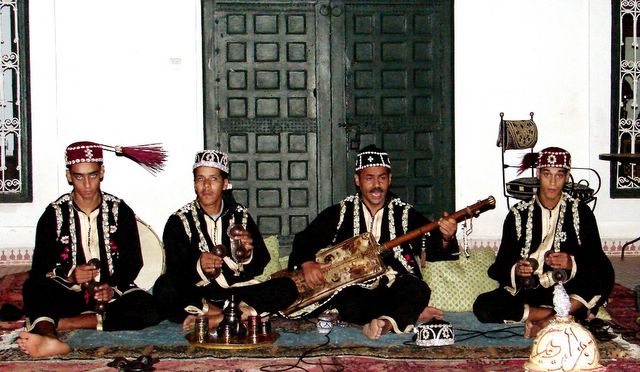Kais & Layla: Understanding Sufism Through a Love Story
One upon a time, there was an Arab boy, named Kais, of both great intelligence and stunning beauty. He lived in a village far into the desert dunes of Arabia and was a source of great pride for his family, which hails from the tradition of tribal nobility. In his village, he was like the sun rising upon a dark alley. He possessed impressive wit and articulate speech. He was pride; he was inspiration; he was hope.
One day he came upon a beautiful girl named Layla, meaning ‘night’ in Arabic. She was also from a noble family but belonging to a competing tribe. The first time they looked upon each other, it was like the miracle of a shining sun in the middle of a moonless night. They fell in love immediately and vowed to keep their love secret. However, their love for each other was so intense that very soon murmurs filled the air revealing their secret to the world.
Layla’s family who held Kais’ tribe in contempt were furious upon hearing the news. They forbade her from leaving her tent and threatened to kill Kais if he ever were to approach Layla or come near her tent. Separated from his beloved, Kais felt as though he was deprived of the food, water, and air that nourish his soul. He walked helplessly through the village reciting poetry about Layla’s beauty. ‘Kais is mad (Majnun in Arabic)’, the villagers said. He was now cast out of his family and tribe for he no longer represented the hope and pride he once inspired.
Soon after, Kais drifted into the desert dunes looking for answers from the compassionate and merciful force up above. He searched for love where answers are true and final beyond the cruelty of this physical world. He traversed the desert and leaned upon the Ka’aba (in Mecca) shouting amid dismayed pilgrims: “O Lord, let my love grow. Let it blossom to perfection and endure. Let me drink from the wellspring of love until my thirst is quenched. Love is all I have, all I am, and all I ever want to be.”
Although many believed him to be Majnun (mad), a few still believed in his wisdom and sought him out in the desert for inspiration. They admired his love for Layla. One night, as he recited poetry to a few captive onlookers, a piece of paper born by the wind landed on his lap. It read: ‘Kais and Layla’. To the surprise of his audience, he tore the paper in half, throwing out the part bearing Layla’s name and neatly folding the part carrying his name for safe-keeping.
Shocked, a man shouted: “Kais, you are indeed a madman. What is the meaning of what you have just done?” To which Kais replied: “If only you knew the reality of love, you would see that when you scratch a lover, you find his beloved”
The man persisted: “But why throw away Layla’s name and not your own?”
Kais answered: “The name is a shell and nothing more. It is what the shell hides that counts. I am the shell and Layla is the pearl; I am the veil and she is the face beneath it.”
Some time later, Layla was forced by her family to marry another man while Kais continued to live among wild beasts in the desert. She too longed for the desert for it is there that her love was stranded. She too suffered greatly, but she suffered in silence.
Once, a merchant told Layla that he could take her to see her beloved if only for a brief moment. He told her that without her, the soul of her beloved was like the ocean in a winter’s night, whipped up by a thousand storms. She cried that it was she who has set his heart on fire and reduced his being to ashes. She, then, urged the merchant to find Kais and arrange for her to look upon his face even if it were for a brief moment.
The Merchant raced to find Kais in the desert where he found him several weeks later. He told him that he should now break his vow of separation from the physical world if only for a moment so at to see his beloved. Kais could only shake his head and say: “Do they not see that while it may be possible for them to have their wishes granted in this life, my longing is something else entirely, something that can not be fulfilled while I remain in this transient world.”
Even as these words came streaming from his very core, he could not resist the opportunity to catch a brief sight of his beloved Layla. He accepted to accompany the merchant to a palm grove where he would be reunited with Layla. But when they were but a short distance from each other, neither could contain themselves. Layla pleaded with the merchant that she could not get any closer for she was like a burning candle that would be consumed completely if it were to get any closer to the fire. Kais, unable to contain the violent shaking of his inner soul, ran back into the desert vanishing like a shadow in a moonless night.
A few years later, Layla’s light dimmed amid her silent suffering and she finally took her last breath as she murmured the name of her beloved. When Kais learned of her death, he raced back to his native village and threw his body over her grave. He lay there motionless while the wild beasts of the desert watched over him and his beloved. No one dared approach them until Kais’ body decayed into dust and bones. It was only then that the animals guarding the grave returned into the empty desert.
On the grave was inscribed:
Two lovers lie in this tomb
United forever in death’s dark womb.
Faithful in separation; true in love:
May one tent house them in heaven above.
This story, which was written 1,000 years before William Shakespeare’s Romeo and Juliet, and is also known as the ‘Story of Layla and Majnun’ is one of the greatest stories told in the Sufi tradition. The narrative above is my own adaptation of selected readings (including Reza Aslan's recent adaptation) as well as an exercise in memory for I was told this story many years ago as a child.
Sufism is to Islam what Layla was to Kais: the pearl beneath the shell; the face underneath the veil. The Sufi tradition considers Islam to be a prelude to the attainment of spiritual unity with the creator beyond a physical and material world. In that, it bears striking similarities to eastern philosophies such as Buddhism, which use meditation and inner struggle to search for spiritual divinity.
I am also reminded by one of my favorite authors, Paolo Coelho, who in The Alchemist, recounts the story of a boy who comes upon a Sufi wise man in the desert. As they conversed about the meaning of life, the Sufi scholar offered the boy some wine. The boy then asked if wine were not prohibited by Islam, to which the Sufi man replied: It is not what enters a man’s mouth that is evil, but rather what comes out of it.
So is the underlying philosophy of the Sufi thought.


























6 Comments:
I commend you on bringing up this topic...its hardly talked about these days. The poetry of Sufi mystics has always been captivating to me.
As a matter of fact, Hafez is the most widely read poet in North America...this shocked me when I learned of it.
the Sufi tradition was once very big in my country. As a matter of fact, Ayatollah Khomeini wrote a lot of poetry similar to Hafez's tales of drinking wine from the cup of the beloved divine.
My personal favourites are Omar Khayyam and Rumi. Khayyam's Rubayyaits, even the english Translations by Fitzgerald, propel you into a different orbit.
April 02, 2005
What a beautiful story... Sufism is hardly ever mentioned in my Middle East Studies classes, and the only thing we learn about it is that it's mystical and forbidden in many countries. By the way, I really enjoyed The Alchemist, but now after reading this story, it makes even more sense! And I have to agree with Khalij that Rubayyaits are beautiful poetry. I have this book of Persian poetry, which is so lyrical and beautiful, but for some reason isn't well known by average Americans or taught in schools here. : (
April 03, 2005
Khalij: Thank you for your kind words and for adding to the post with references to Hafez, Jalaluddin Rumi and Omar Khayam. I could not have said it any better: such writings do propel the reader into a different orbit.
Irina: I agree that it's such a shame that brilliant literary work like the great tradition of Persian Sufi poetry are not more readily present in academics. But, like Khalej, I too was surprised (pleasantly) by how popular Rumi and Khayam are in North America.
April 03, 2005
A beautifull adaptation.
I had never heard of the Sufi, nor this story before, it sent goose bumps down my spine.
I am intrigued to learn more about Sufism.
April 04, 2005
Hi Jawad,
Hope I'm not hounding you..this is my second comment here, but I just had to say thanks.
Thanks to you and this article, I read up a bit on Sufism today, at the Threshold website. And even though I am not religious, or should I say, I have my own belief system, I must say that the articles written about Sufism present a whole different Islam then what I was exposed to growing up, and in turn denied from my life, simply because it didn't feel right in my heart.
Sufism really seems to be a more logical, kinder form of Islam, preaching equality, generosity, and being as one with the universe.
It's incredible, so like I said, since this is where I first heard about this, I wanted to drop by and say thank you :)
April 05, 2005
esharp: You are most welcome. I am glad that the post was helpful to you and I am extremely happy that your intellectual curiosity is leading you to find out more about Sufism. I highly recommend that you read the poetry of Jalaluddin Rumi and Omar Khayyam. Another great Sufi scholar is Imam Abu Hamid al-Ghazali.
See the great thing about Sufism is that it is more spiritual than methodologically religious. Its focus is an individual search for spiritual unity with the creator; a relentless inner struggle. Like the Dalai Lama said: You don't have to be religious to be spiritual. Religion is only one way or for some a prelude to spirituality. There are many other ways to get there.
April 05, 2005
Post a Comment
<< Home